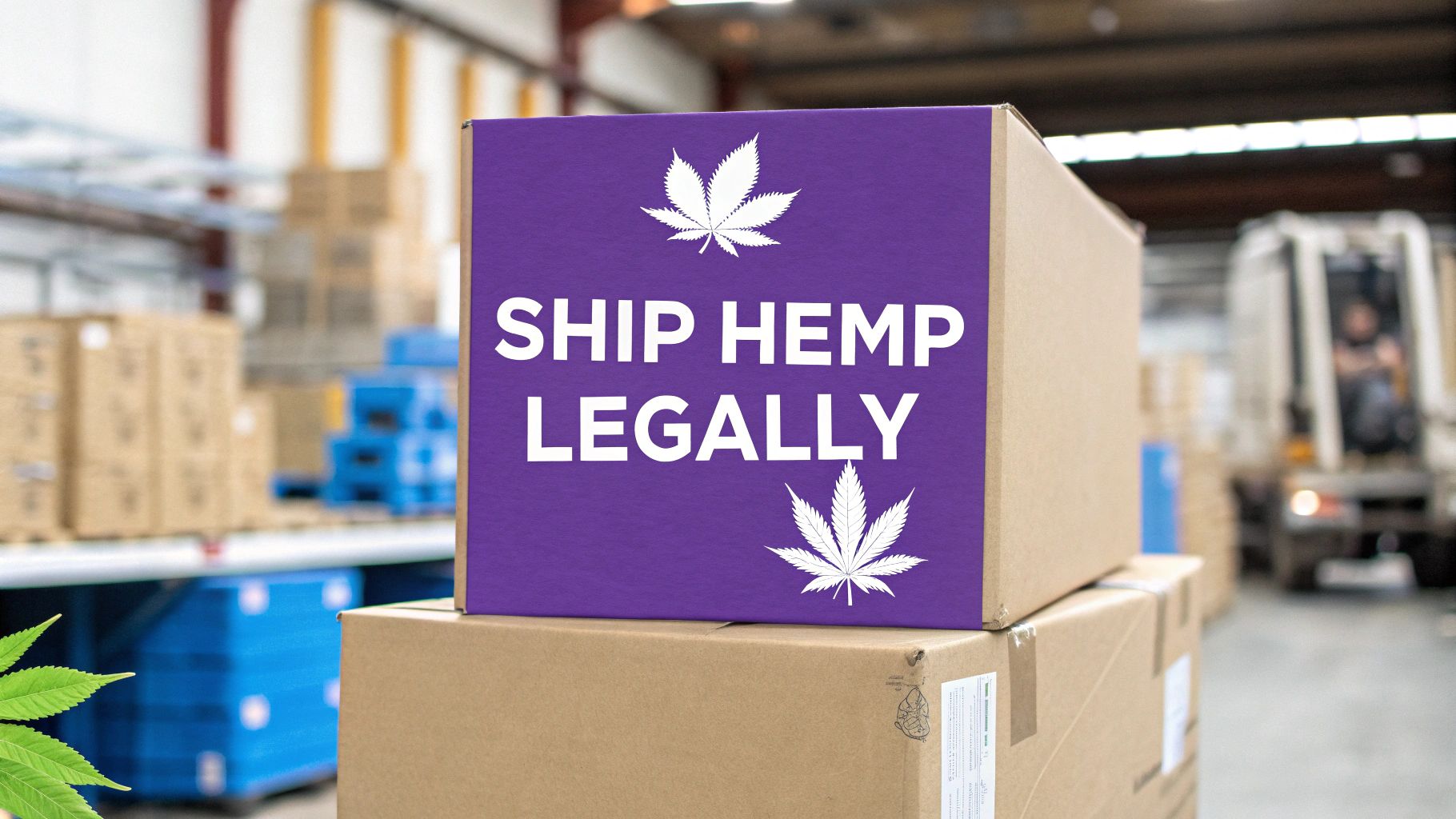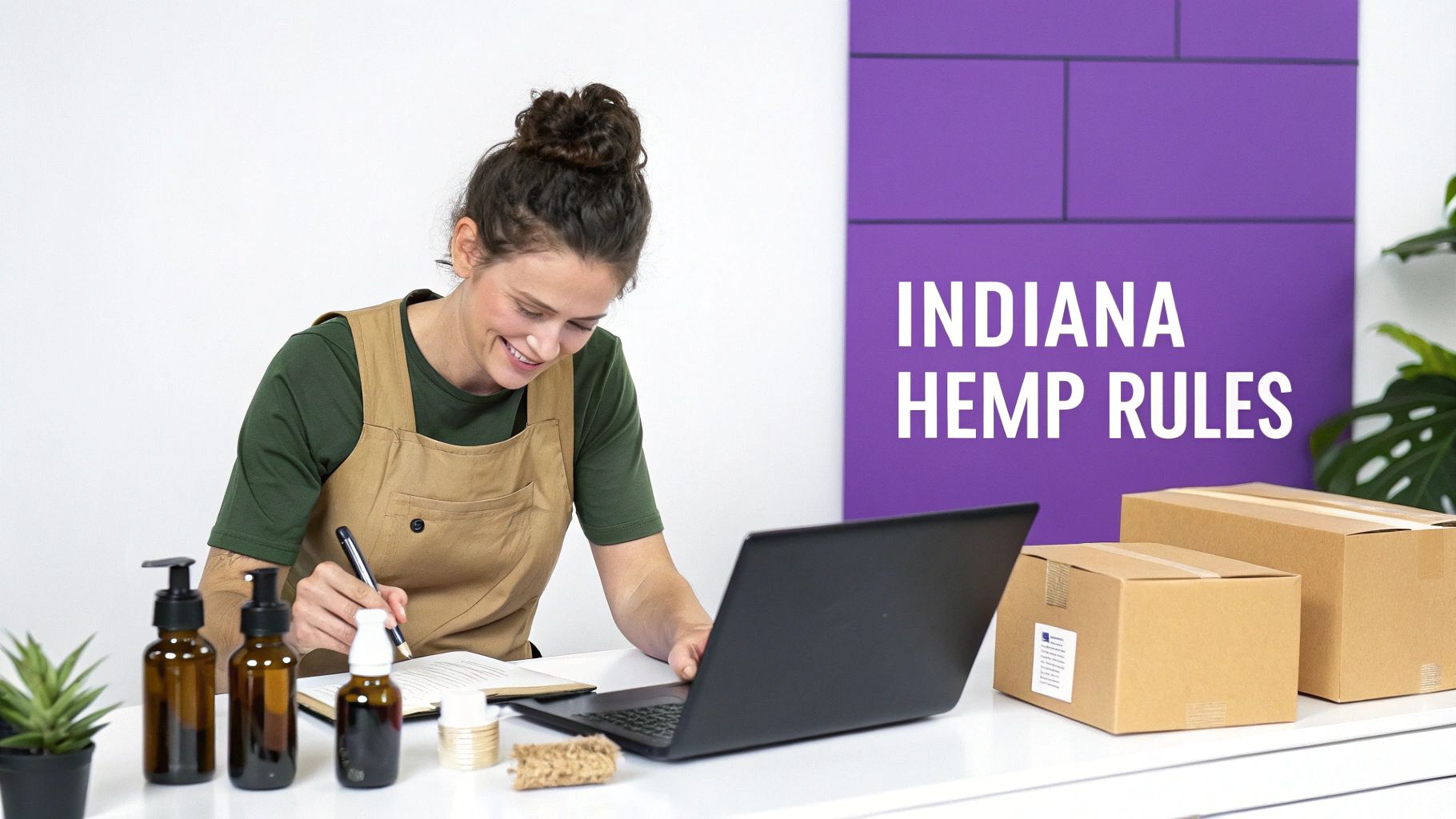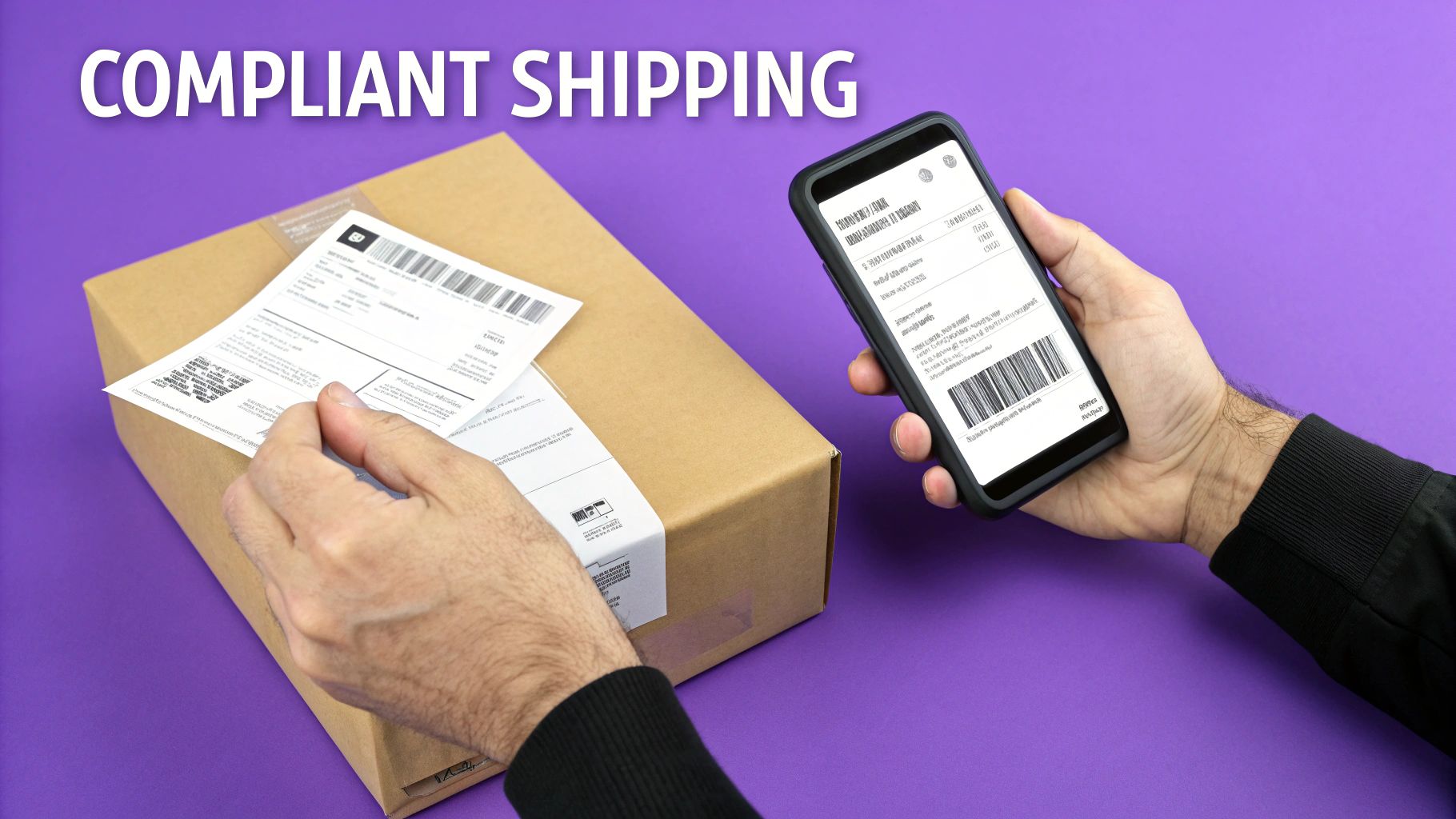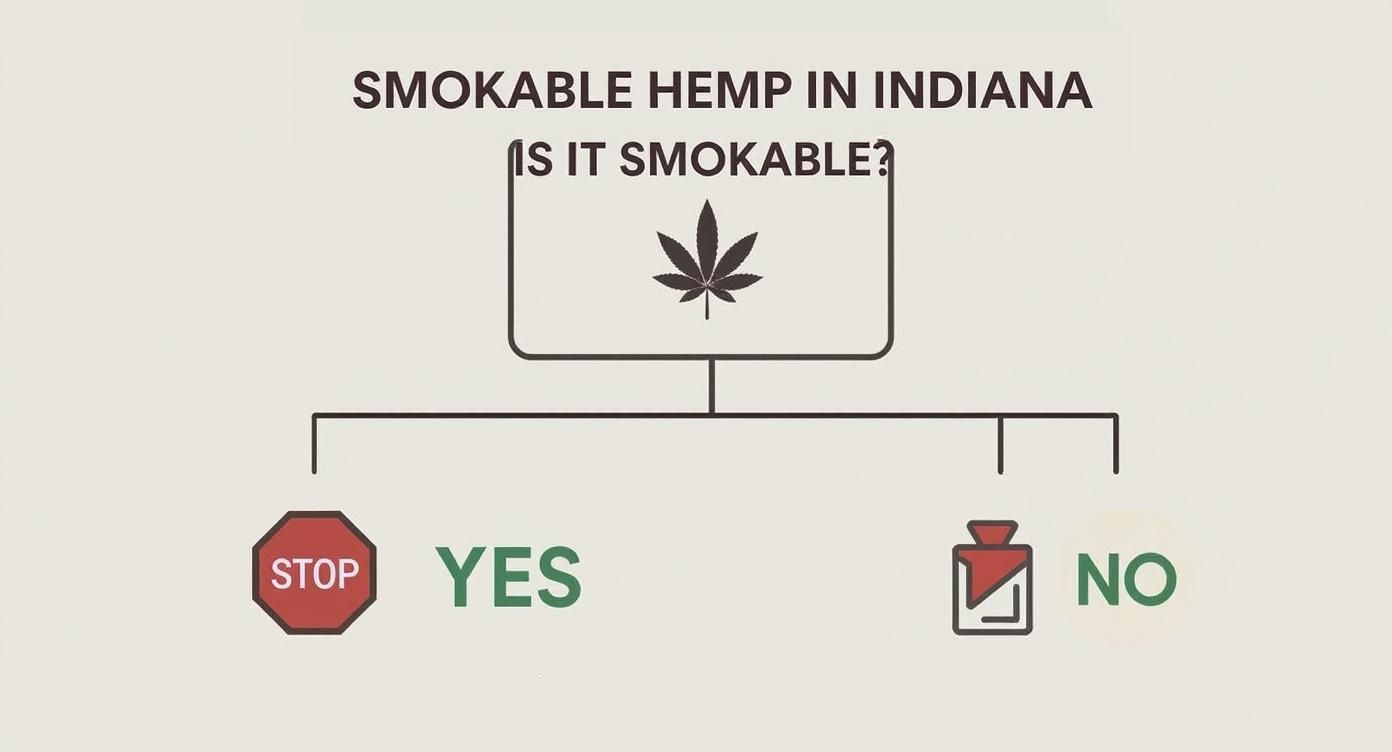
CBD/Hemp/THCA Shipping Laws Indiana: Quick Compliance Guide
CBD/Hemp/THCA Shipping Laws Indiana: Learn practical steps to stay compliant, avoid penalties, and ship CBD/Hemp/THCA products legally and safely.
Cody Y.
Updated on Oct 26, 2025
Trying to make sense of CBD, Hemp, and THCA shipping laws in Indiana can feel like you're wading through legal jargon, but it really boils down to one simple rule: if it's a hemp-derived product with less than 0.3% Delta-9 THC, you're generally in the clear. Indiana's state laws fall right in line with the federal 2018 Farm Bill, drawing a sharp distinction between legal hemp and illegal marijuana.
What Every Seller Needs to Know About Indiana Hemp Laws

When you're looking at the legal landscape for hemp in Indiana, there's one number that matters above all else: 0.3% Delta-9 THC. Think of it as the legal speed limit for hemp. Stay at or below that number, and you've got legal hemp. Go even a fraction over, and it's classified as marijuana, which is still illegal in the state. This single percentage is the foundation for all CBD, Hemp, and THCA shipping rules Indiana enforces.
This standard, first laid out in the 2018 Farm Bill and then adopted by Indiana, flung the doors wide open for a whole host of hemp-derived products to be sold and shipped. But here's the catch: staying legal is about much more than just the THC content. You have to nail the state’s strict compliance rules, too.
For a quick overview of what's allowed and what to watch out for, this table breaks it down.
Indiana Hemp Shipping Legality at a Glance
| Product Type | Shipping Legality Status | Primary Restriction |
|---|---|---|
| CBD Oils & Tinctures | Legal | Must be below 0.3% Delta-9 THC and have a scannable QR code on the label. |
| Edibles & Gummies | Legal | Same as oils: below 0.3% Delta-9 THC with proper labeling and COA. |
| Topicals & Creams | Legal | Subject to the 0.3% Delta-9 THC limit and labeling requirements. |
| Smokable Hemp Flower | Illegal | Completely banned for sale and shipping, regardless of THC content. |
| THCA Products | Legal (with caution) | Must meet the 0.3% Delta-9 THC threshold; high-THCA flower is legally risky. |
While many products are legal to ship, the state's enforcement actions show they aren't messing around with the details.
Compliance Beyond the THC Limit
Indiana takes enforcement very seriously, especially when it comes to product safety and transparency. The state doesn't just ask for compliance; it demands proof. If you're an e-commerce seller, you need to have these areas locked down:
- Accurate Labeling: Your product labels have to be crystal clear. They must detail the exact cannabinoid content and include a scannable QR code that links directly to the lab results.
- Third-Party Testing: A Certificate of Analysis (COA) isn't optional—it's a must-have. This document from an accredited lab is your proof that the product's THC level is within the legal limit.
- Product Type Restrictions: Some products are just off-limits, period. The big one is smokable hemp flower, which is explicitly banned no matter what its THC content is.
This isn't just theoretical. The state has a well-documented history of conducting raids on stores for simple labeling violations, confiscating any products that lack proper documentation or fail to meet testing standards. It’s a stark reminder of just how critical it is to follow every single rule to the letter.
Key Takeaway: In Indiana, compliance is a package deal. It’s not enough for your product to be under the 0.3% Delta-9 THC line. It also has to meet the state's tough labeling and testing mandates to be considered legal to ship.
For online sellers, this means every single package you send out is a declaration that you've done your homework. If you haven't, you're risking seized shipments, lost revenue, and a whole lot of legal headaches. Getting a solid grasp on general hemp shipping rules and restrictions is a great first step before diving into state-specific complexities like these.
Getting Your Shipping and Compliance Checklist Right

Knowing Indiana’s legal framework is one thing, but actually getting products to customers is where the rubber meets the road. Every single package you ship is a pop quiz on your compliance knowledge. Getting it wrong can mean seized products, suspended accounts, and a whole lot of legal headaches.
Think of your shipping process as the final quality check before your product lands in your customer's hands. To stay on the right side of the CBD/Hemp/THCA shipping laws Indiana enforces, you have to treat your documentation and labeling with absolute seriousness. This isn't just about moving a box from point A to B—it's about proving its legality every inch of the way.
The Non-Negotiable Certificate of Analysis
If there's one document that's the absolute star of the show, it's the Certificate of Analysis (COA). This report, issued by an accredited third-party lab, is your product's legal passport. It’s the official proof of its cannabinoid profile, confirming it contains less than 0.3% Delta-9 THC on a dry weight basis.
Trying to ship without a COA is like flying without a pilot. It's not going to end well. Indiana law is crystal clear: product labels must have a QR code or website link that takes customers directly to this document. This transparency isn't just for show—it protects consumers and proves to law enforcement that your product is a legal hemp derivative, not marijuana.
A package without a COA is just a box of mystery plant material in the eyes of regulators and carriers. The COA transforms it into a verified, compliant, and shippable consumer good.
Carrier Policies and Best Practices
On top of state law, the major shipping carriers have their own playbooks for handling hemp products. These rules often go a step beyond what the law requires, and ignoring them can get your account flagged or shut down for good, grinding your business to a halt.
Here’s a quick rundown of what you’re up against:
- USPS: Usually the most hemp-friendly carrier of the bunch. But don't get too comfortable—they still require you to keep COAs on file for at least two years and can ask to see them at any time.
- UPS: They’re more selective. You need to be pre-approved for their hemp shipping program, and they have strict rules about where products can originate from and be sent to.
- FedEx: They put the entire compliance burden squarely on your shoulders. FedEx prohibits raw hemp plant material and requires shippers to comply with every single federal, state, and local law out there.
While nailing Indiana's hemp laws is your top priority, it also helps to understand general e-commerce compliance best practices, as they provide a solid foundation for any online seller. At the end of the day, following these carrier-specific rules is just as crucial as following state regulations for getting your products delivered successfully.
Navigating the Legal Gray Area of THCA and Delta-8
<iframe width="100%" style="aspect-ratio: 16 / 9;" src="https://www.youtube.com/embed/3fzIBECJ23c" frameborder="0" allow="autoplay; encrypted-media" allowfullscreen></iframe>While standard CBD products follow relatively clear rules in Indiana, things get a lot more complicated when you enter the world of other hemp-derived cannabinoids. Specifically, compounds like THCA (Tetrahydrocannabinolic acid) and Delta-8 THC exist in a risky legal gray area, creating a minefield for e-commerce businesses shipping into the state.
The heart of the issue lies in a simple chemical reaction. THCA is a non-psychoactive acid found in raw cannabis plants—it's the natural precursor to the stuff that gets you high. When you apply heat by smoking, vaping, or cooking it, a process called decarboxylation converts THCA directly into intoxicating Delta-9 THC. That potential transformation is the entire reason for the legal headache.
The Total THC Dilemma
Indiana law, just like the federal Farm Bill, is laser-focused on keeping Delta-9 THC concentration at 0.3% or less. A raw THCA flower product might look perfectly compliant on paper, easily meeting that standard.
But regulators aren't naive. They're increasingly closing this "loophole" by looking at a product's "total THC" potential instead.
This calculation adds up the existing Delta-9 THC and all the potential Delta-9 THC that could be created from the THCA. The formula looks like this:
Total THC = (THCA % × 0.877) + Delta-9 THC %
If that final number ticks above the 0.3% threshold, regulators can argue the product is illegal marijuana, no matter what its initial Delta-9 level was. This makes shipping high-THCA flower to Indiana an incredibly high-risk move. Law enforcement is unlikely to make a distinction between your product and illegal marijuana during a seizure.
To get a better handle on this, it’s worth understanding the critical shipping law differences between hemp and marijuana products in more detail.
Indiana’s Regulatory Scrutiny
Indiana has been taking a hard look at intoxicating cannabinoids derived from legal hemp. Products like Delta-8 have managed to find a market in the state precisely because the laws were so narrowly focused on Delta-9 THC, leaving a gap for other psychoactive compounds to slip through.
In response, state lawmakers are pushing for new legislation to get a handle on these products, including proposals for advertising restrictions aimed at protecting kids. This has sparked a fierce debate between legislators, retailers, and law enforcement over how to manage these goods. You can read more about Indiana's push for new Delta-8 rules on CannabisRegulations.ai.
This legislative movement is a clear signal that the ground is shifting. For any business owner, the message is simple: the environment for intoxicating hemp products in Indiana is unpredictable and hazardous.
Key Insight: Shipping THCA and Delta-8 products to Indiana means operating in a space where the laws are actively being debated and could change suddenly. What is permissible one day could be explicitly illegal the next, putting your business at immediate risk of seized shipments and legal penalties.
Why Smokable Hemp Is a Hard “No” in Indiana
While the 2018 Farm Bill opened up the national market for most hemp products, Indiana drew a hard line in the sand on one specific category: smokable hemp. For any e-commerce business, this isn't a gray area to navigate. It's a dead end.
Shipping any form of smokable hemp into the state is a direct violation of Indiana law, plain and simple. It doesn’t matter what the THC content is.
The ban is airtight and leaves zero wiggle room. The state’s definition of "smokable hemp" is broad, covering any hemp-derived product designed for inhalation. This includes:
- Hemp Flower and Bud: Raw, cured, or loose hemp flower is strictly forbidden.
- Hemp Pre-Rolls and Joints: Any pre-packaged hemp cigarettes or joints are illegal to sell or ship.
- Any Product Meant for Smoking: This catch-all covers any hemp material that could be smoked, even if it's not sold as a finished pre-roll.
This means even a product with less than 0.3% Delta-9 THC is illegal based on its form alone. The official reasoning often comes down to a practical problem for law enforcement: telling the difference between legal hemp flower and illegal marijuana in the field is nearly impossible.
A History of Legal Fights
Indiana’s tough stance didn’t go unchallenged. The ban quickly became a legal battleground, highlighting the ongoing tension between federal hemp legalization and a state's right to regulate. Hemp industry advocates sued, arguing that the 2018 Farm Bill federally protects the interstate transport of legal hemp, making Indiana's law invalid.
At first, a federal court agreed with the industry and put a temporary stop to the ban. But the win was short-lived. The state's prohibition was eventually upheld on appeal, cementing its place in Indiana law.
Today, the issue remains settled but contentious. Under Indiana Code IC 35-48-4-10.1, manufacturing, delivering, or even possessing smokable hemp is a Class A misdemeanor. This messy legal history is exactly why the ban remains firmly in place. You can get a deeper dive into Indiana's legislative updates on this at EastTreeCBD.com.
The Bottom Line for E-Commerce Sellers
For anyone trying to navigate the tricky CBD/Hemp/THCA shipping laws Indiana has, the message couldn’t be clearer. You absolutely must block all sales of smokable hemp products to any address in the state.
Warning for Sellers: Don't test this. Getting caught shipping smokable hemp to Indiana can result in seized packages, criminal charges for both you and your customer, and getting your accounts suspended by carriers like UPS and FedEx.
The potential profit from a sale is nothing compared to the legal and financial nightmare that could follow. Setting up automated shipping rules to block these orders isn't just a good idea—it's a critical step to protect your business from the serious risks that come with Indiana's smokable hemp ban.
Automating Your Shipping Rules to Ensure Compliance
Trying to manually check every single order against Indiana's tangled web of hemp regulations is a recipe for disaster. It only takes one simple mistake—like shipping a smokable hemp product to an address in Bloomington—to cause seized packages, frustrated customers, and some very serious legal headaches.
The only sustainable way to manage the tricky CBD/Hemp/THCA shipping laws Indiana enforces is to take human error out of the equation completely.
This is where automation becomes your best friend. Instead of relying on a pre-shipment checklist that’s easy to ignore during a sales rush, you can put a system in place that acts as a digital gatekeeper. This system automatically enforces your rules before an order is even completed, making sure a banned product never even gets a shipping label.
This decision tree breaks down the simple, automated logic needed to block prohibited smokable hemp shipments to Indiana.

As the visual shows, the rule is absolute: if a product is meant for smoking, it cannot be shipped to Indiana. Period.
Building Your Automated Defense
Setting up automated shipping restrictions isn't some complex technical nightmare; it's a straightforward business process. Think of it like setting up a spam filter for your email. You create a rule—"if an email is from this sender, send it to the junk folder"—and the system does the rest. Shipping compliance tools work the exact same way.
For an e-commerce store, a basic rule would look something like this:
- IF the customer's shipping address is in Indiana,
- AND the cart contains a product tagged as "smokable hemp" or "THCA flower,"
- THEN block the order and display a message explaining the restriction.
This simple logic instantly stops a prohibited sale in its tracks. It works quietly in the background, protecting your business 24/7 without you or your team having to lift a finger. You set the rules once, and the system makes sure they're followed for every single transaction.
By automating these checks, you transform compliance from a repetitive, time-sucking chore into a reliable, set-it-and-forget-it safeguard for your entire business.
How to Implement This with Shipping Tools
For platforms like WooCommerce and Shopify, specialized apps like Ship Restrict are built to make this process incredibly simple. These tools give you an intuitive interface where you can build granular rules based on location and product attributes. If you're looking for a practical way to approach this, walking through a good business process automation checklist can be a huge help.
The interface lets you define exactly which products are restricted and where they can't go, giving you total control over your shipping compliance. This level of precision is crucial for navigating the differences in state laws. For businesses on other platforms, learning about automated shipping compliance for WooCommerce stores offers similar, valuable insights.
At the end of the day, automation is what lets you ship with confidence.
Your Top Questions About Shipping Hemp to Indiana
Trying to make sense of Indiana's CBD, Hemp, and THCA shipping laws can feel like hitting a moving target. We get a lot of questions from business owners, so here are some straight answers to the most common ones. Getting this right is key to building a compliant, confident shipping strategy.
Can I Legally Ship THCA Flower to Indiana?
In a word? No. Shipping THCA flower to Indiana is incredibly risky, and we strongly advise against it.
The problem comes down to how Indiana views a product's potential to get someone high. While raw THCA isn't the same as Delta-9 THC, it turns into it the moment you apply heat—like lighting it up.
Because of this, state regulators are increasingly using a "total THC" calculation. This method looks at the final Delta-9 THC content after it's been converted, which almost always pushes high-THCA flower way over the legal 0.3% limit. From a legal perspective, that makes it the same as marijuana in the eyes of law enforcement. To protect your business from seized packages and legal trouble, it's safest to block all THCA flower shipments to Indiana.
What Paperwork Needs to Go with a CBD Shipment to Indiana?
Every single hemp product you ship to an Indiana address absolutely must include a valid Certificate of Analysis (COA) from an accredited, third-party lab. Think of it as your product's legal passport—it's non-negotiable proof that you're compliant.
You can provide this proof in a couple of ways:
- A scannable QR code printed right on the product's packaging.
- A physical copy of the COA tucked inside the shipping box.
This document is what proves your product's Delta-9 THC level is safely under the legal limit. And don't forget to double-check the rules for your shipping carrier (like USPS, UPS, or FedEx), as they often have their own documentation requirements for handling hemp products.
Are Delta-8 Gummies Okay to Ship to Indiana?
Right now, Delta-8 products are in a very shaky legal gray area in Indiana. They aren't explicitly illegal like smokable hemp flower, but their footing is anything but solid. Lawmakers are actively looking at new rules, including potential outright bans on any hemp-derived cannabinoid that can cause intoxication.
This means the rules could change overnight. Shipping these products is a gamble, because what's allowed today could be illegal tomorrow. If you decide to ship Delta-8 to Indiana, you have to watch the state's legislative sessions like a hawk to avoid getting blindsided by a new law.
What Happens If I Accidentally Ship a Banned Product?
Shipping a banned item by mistake—like smokable hemp flower—can bring on a world of hurt for your business. The consequences are usually swift, severe, and expensive.
Your package will almost certainly be seized by law enforcement. Worse, both you (the seller) and your customer could face potential criminal charges. This can also set off a chain reaction of operational nightmares: payment processors freezing your accounts, shipping carriers terminating your contracts, and serious, long-term damage to your brand’s reputation.
Using an automated shipping restriction tool is the only surefire way to prevent these kinds of costly errors from happening in the first place.
Stop guessing and start complying. Ship Restrict for WooCommerce automates your shipping rules, blocking prohibited orders before they become costly mistakes. Protect your business and ensure every shipment is compliant by visiting https://shiprestrict.com to learn more.

Cody Yurk
Founder and Lead Developer of ShipRestrict, helping e-commerce businesses navigate complex shipping regulations for regulated products. Ecommerce store owner turned developer.